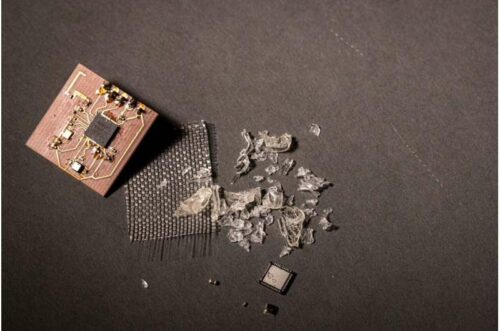Discover how this technology promises recyclability while paving the way for a more sustainable approach to electronics manufacturing.

A recent report by the United Nations highlighted a rise in electronic waste generation, reaching 137 billion pounds globally in 2022, marking an 82% increase since 2010. Despite this surge, less than a quarter of this waste was recycled, underscoring a pressing issue in our sustainability efforts. One major obstacle lies in the lack of scalable systems for recycling printed circuit boards (PCBs), ubiquitous in electronic devices. PCBs, crucial for housing and connecting electronic components, pose a formidable challenge due to their complex composition. Typically comprised of layers of glass fiber coated in hard plastic and laminated with copper, the separation of these materials proves difficult, leading to accumulation in landfills or hazardous burning practices, particularly in developing nations.
Addressing this challenge, a team led by researchers at the University of Washington has devised a solution: a PCB material that matches the performance of traditional counterparts while having recyclability. Leveraging a solvent-based process, the researchers transformed a type of sustainable polymer known as vitrimer into a reusable jelly-like substance, preserving its integrity for repeated recycling without significant material loss.
This termed as “vPCBs” (vitrimer printed circuit boards), achieves good recovery rates, reclaiming 98% of the vitrimer, 100% of the glass fiber, and 91% of the solvent used in the recycling process. The electrical properties of vPCBs remain on par with conventional PCBs, offering a promising avenue for sustainable electronics manufacturing. Vitrimer polymers, characterized by their ability to rearrange molecular bonds under specific conditions, provide the foundation for this groundbreaking technology. This intrinsic “healability” and recyclability distinguish vitrimers from conventional plastics, offering a molecular-level solution to the e-waste dilemma.
The transition to vPCBs presents minimal disruption to existing manufacturing processes, with potential applications across diverse industries. Environmental assessments reveal substantial reductions in greenhouse gas emissions and carcinogenic pollutants, signaling a significant step towards a circular economy for PCBs. Scaling up recycling efforts necessitates comprehensive infrastructure and regulatory frameworks to incentivize e-waste collection and ensure cost parity with conventional practices. As the team emphasizes, future advancements must prioritize sustainability from the outset, laying the foundation for a more environmentally conscious approach to electronic waste management.






